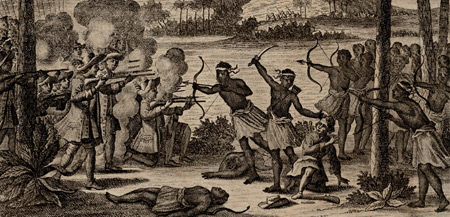England and the Netherlands: the ties between two nations > The spice trade
Until round 1800, cloves, mace and nutmeg could only be found on the Moluccas, a group of islands now part of Indonesia and formerly called Spice Islands. Spices have many uses: as medicine, for seasoning food and drinks, and as perfume. Cloves were supposed to be a remedy for loss of memory and toothache, mace for seasickness and rashes. Still, the volume of trade in spices remained small as only the happy few were able to afford such a luxury. In view of the limited potential of the market, the only possibility for merchants to earn much money was to control the transport to Europe. As from 1500, the Portuguese succeeded in doing so. Around 1660 the monopoly came into the hands of the VOC and the English complained that it was impossible to move one single clove without Dutch authorization.
Governor-General Jan Pietersz. Coen (1587-1629) and many others as well used brute force in order to secure monopoly of the spice trade on the Moluccas and get rid of the English competition. The population of Banda was ruthlessly enslaved and even deported. The VOC had clove trees belonging to adversaries uprooted and villages burnt down. Hong expeditions were military tours of inspection by a fleet of armed praus – the word hongi originates from the island of Ternate in the Moluccas and means armada. At least ten years are needed before cloves can be harvested from a young tree. So, the inhabitants lost their livelihood and were left no choice but to move away or die of starvation.

In 1651, after a more or less calm period, a new rebellion against Dutch rule broke out on the Moluccas. To protect its monopoly of the clove trade, the VOC had once more imposed restrictions on planting clove trees. Majira, a chief in Hoamoal on the island of Seram, refused to destroy part of the young plantation and also wanted to sell cloves to Asian traders. Amasser, a town on the island of Sulawesi, which was ruled by the Sultan of Goa, supported the insurgents, as did Ternate.
In the period between 1651 and 1656, the governor of the Moluccas, Arnold de Vlamingh van Oudshoorn, managed to suppress the rebellion with the help of Moluccan chiefs, who put cora-coras (war praus) as his disposal. Later this was to be called The Great Ambon War or Hoamoal War.

The chronicler Levinus Bor, who accompanied De Vlamingh van Oudshoorn, reported on the latter’s campaign in the weighty book Amboinse oorlogen door Arnold de Vlaming van Oudshoorn als superintendent, over d'oosterse gewesten oorlogaftig ten eind gebracht (Ambon Wars resolved martially by Arnold de Vlamingh van Oudshoorn as superintendant of the eastern districts). Following the Ambon War, growing cloves was restricted to Ambon and the islands of Haruku, Saparua and Nusa Laut with their strong Dutch forts. The clove monopoly was now firmly in the hands of the VOC.
Early in the 1770s, French adventurers smuggled spice cuttings to the island of Mauritius in the Indian Ocean, but it took thirty more years before the young plantations yielded enough cloves to break the monopoly. It was not until 1795, when the English occupied the Dutch trade settlements on the Moluccas, that the cultivation of cloves and nutmeg spread over the entire – nowadays Indonesian – archipelago and later on, to other parts of the world as well.
> Read on: The Ambon murder
< Go back to: Rivalry
